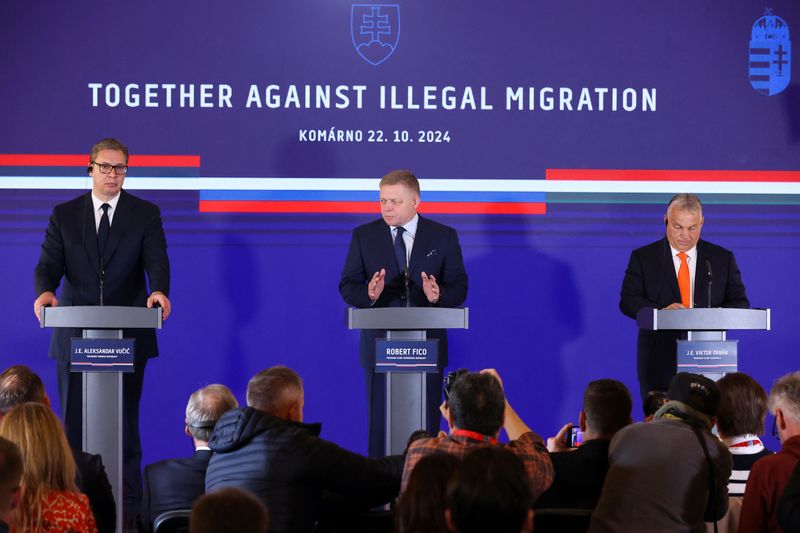KOMARNO, Slovakia (Reuters) -The leaders of Hungary, Slovakia and Serbia on Tuesday affirmed their efforts to curb illegal migration into the European Union, adding that protecting the bloc's external borders was the best defence and more EU funds were needed.
The number of illegal crossings through the western Balkans fell 79% year-on-year to just under 17,000 in the first nine months of 2024, according to data from border agency Frontex.
Meeting in Komarno, Slovakia, on the Hungarian border, the leaders praised their efforts to cut the number of migrants, mainly from the Middle East and Africa, who have come via the "Balkan route" through Serbia and into the EU via Hungary.
Migrants typically move on to richer countries in western Europe, like Germany.
Illegal migration remains a political problem across Europe nearly a decade after the crisis in 2015, when around 1 million people arrived in the bloc. Arrivals last year were around a third of that figure.
The issue has helped fuel the rise of far-right parties and pushed governments to take tougher measures. EU leaders agreed last week on charting a tighter policy to speed up returns of migrants entering illegally.
Hungarian Prime Minister Viktor Orban and Slovak Prime Minister Robert Fico have long been some of the harshest critics of EU migration policy, opposing ideas such as quotas for redistributing migrants in the bloc.
"We were right when we said very clearly at the beginning of the migration crisis that the basis of the fight against illegal migration is the protection of external EU borders," Fico said, calling the fight against illegal migration a priority.
He said they had discussed how a substantial part of the EU budget after 2027 should be devoted to fighting illegal migration, as it was a serious threat.
Serbian President Aleksandar Vucic said Serbia has seen 80% fewer migrants this year.
After 2015, Hungary erected a heavily guarded fence on its southern border and Orban has clashed with Brussels over migration policies. He said asylum applications must be assessed before someone is allowed to enter the EU, saying this model, used in Hungary, was the only one that worked.
Hotspots set up in the last safe countries for migrants, for example in Africa, could be a mass solution, he said.

Italy last week began working with EU non-member Albania by sending migrants there to have their asylum requests processed, a scheme to deter boat crossings which other EU leaders have said could be a model.
Vucic said Serbia, which is not an EU member, would never agree to create hotspots for illegal migrants on its territory.